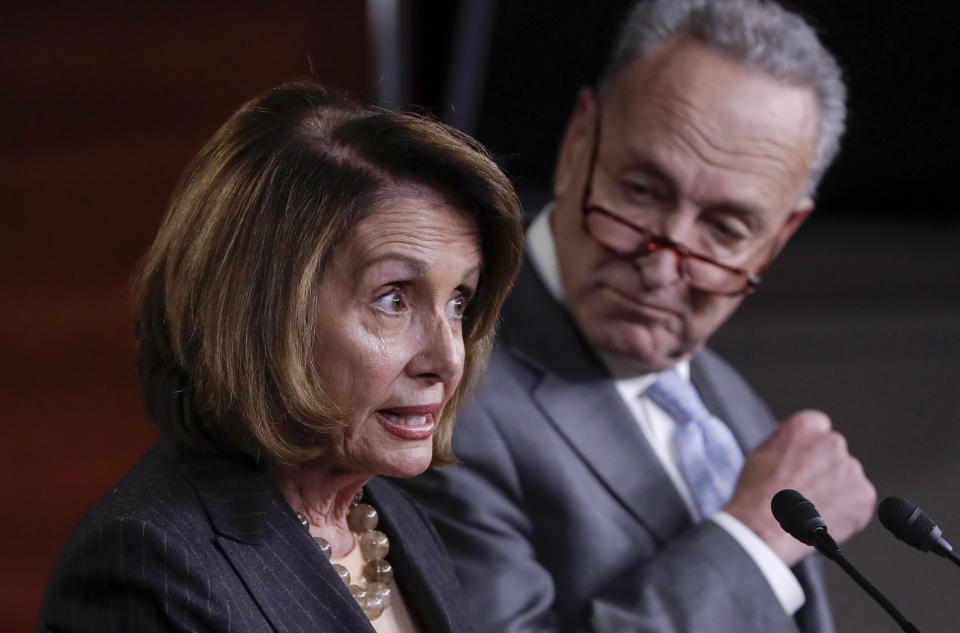Democrats still don’t have a message on the economy

“We’re not Trump!”
This persuasive mantra apparently carried Democrats to a handful of victories in the recent off-year elections, where they picked up the governorships of Virginia and New Jersey and made a few impressive state-house gains. This is supposedly a repudiation of President Donald Trump, and a forewarning that Republicans who control Congress could lose the House next year and in a more dramatic scenario, the Senate.
Except there’s one problem: Democrats still don’t have a coherent message, aside from “we’re not Trump.” That’s especially true on the economy, following a presidential election in which the Democratic candidate, Hillary Clinton, completely failed to connect with working-class voters who feel abandoned by corporate, technology and political elites.
What do Democrats stand for?
Over the summer, Chuck Schumer, the Senate Minority Leader, acknowledged that “we didn’t tell people what we stood for.” Then he released a plan, called “A Better Deal,” to remind voters what his party does stand for: a $15 minimum wage that would hammer many businesses, a $1 trillion infrastructure plan for which no funding exists, Trumpian-style protectionism, and a bunch of policy ideas from President Barack Obama’s playbook that never came close to passing.
If you haven’t heard of the “Better Deal” plan, that’s because it’s a dull and inauthentic effort to make Democrats seem like they get it. Much of the political establishment panned it immediately. The main spokespeople for this plan are Schumer, who’s 66, and House Minority Leader Nancy Pelosi, who’s 77. There’s talk that the main contenders for the Democratic presidential nomination in 2020 will be Joe Biden, who will be 77, and Sen. Bernie Sanders, who will be 80. If Sen. Elizabeth Warren runs, she’ll be 71. Real leaders recruit and groom their successors, and know new blood can be just as important as experience. If there’s any new blood in the Democratic Party, it’s still interning for Schumer and Pelosi.
Sanders obviously hit a nerve last year with his calls for universal health care, free college and higher taxes on the wealthy. So, it’s no surprise the Democratic message is moving left, in Sanders’ direction. But this is a failing strategy, for one simple reason: It relies on government solutions, and Americans deeply distrust the government. There aren’t enough leftists in America to win on a strategy that says the solution to Trump’s abrasiveness is more federal intervention.
Democrats have a chance at fixing health care
The Dems do have one giant opening: health care. Republicans flubbed that issue so badly this year, with three failed and humiliating attempts to repeal the Affordable Care Act, that they have basically admitted to having no ideas on health care. Yet it remains a giant problem. Soaring costs are a burden for just about everybody, especially people who have to buy their own insurance and don’t qualify for subsidies under the ACA. Obamacare, as the ACA, is known, extended coverage to more people, but it did virtually nothing to get medical costs under control. Somebody needs to address that, and the Republicans have basically said, not us.
Some Democrats favor “Medicare for all,” which is Sanders’ plan for moving to a system in which all health care coverage comes from the government. Bad idea. Just 45% of Americans say they trust the executive branch, which would have to administer universal health care, and only 35% trust Congress, which would write such a law. Here’s a better idea: Build on the existing health care system, based on employer-provided coverage, with better incentives to control costs. Focus heavily on easing the burden on private business owners, who get gobsmacked year after year with double-digit increases in insurance costs that leave little left to offer raises to their workers. Perhaps offer a new government backstop for people unable to pay for coverage or obtain it through an employer. But don’t threaten to break the parts of the health care system that work, which is what Sanders would do.
Finding their way to 2018
Trump and his fellow Republicans have left few other openings for Democrats to exploit. Trump’s 20th-century view of the world—his support for fossil fuels, for instance, and his call for more assembly-line jobs—ignores the role of technology in the modern economy. Democrats could seek ways to spread digital prosperity further, and probably enlist the help of many prominent Silicon Valley moguls. There’s also a sound economic case for more legal immigration, rather than less, as Trump prefers, because it would expand the labor force and help offset the aging of American society. That would boost growth and help keep the economy vibrant.
If all that fails, Democrats will end up running in 2018 as nothing more than not-Trumpers. It may sway some people, but voters tend to prefer knowing who their candidates are, rather than who they are not. If the Democrats know who they are, now would be a good time to tell voters.
Confidential tip line: rickjnewman@yahoo.com. Encrypted communication available.
Trump’s plan will raise taxes, nearly one-third of voters think
White House economist: Middle class will benefit from business tax cuts in 3-5 years
Rick Newman is the author of four books, including Rebounders: How Winners Pivot from Setback to Success. Follow him on Twitter: @rickjnewman

